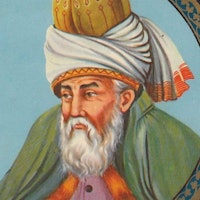The breeze at dawn has secrets to tell you. Don’t go back to sleep. You must ask for what you really want. Don’t go back to sleep…
Jalaluddin Mevlana Rumi

Don’t Go Back to Sleep
Topic: Immanence & Transcendence
When I see your face, the stones start spinning!
You appear; all studying wanders.
I lose my place.Water turns pearly.
Fire dies down and doesn’t destroy.In your presence I don’t want what I thought
I wanted, those three little hanging lamps.Inside your face the ancient manuscripts
Seem like rusty mirrors.You breathe; new shapes appear,
and the music of a desire as widespread
as Spring begins to move
like a great wagon.
Drive slowly.
Some of us walking alongside
are lame!
~
Today, like every other day, we wake up empty
and frightened. Don’t open the door to the study
and begin reading. Take down a musical instrument.Let the beauty we love be what we do.
There are hundreds of ways to kneel and kiss the ground.
~
Out beyond ideas of wrongdoing and rightdoing,
there is a field. I’ll meet you there.When the soul lies down in that grass,
the world is too full to talk about.
Ideas, language, even the phrase each other
doesn’t make any sense.
~
The breeze at dawn has secrets to tell you.
Don’t go back to sleep.
You must ask for what you really want.
Don’t go back to sleep.
People are going back and forth across the doorsill
where the two worlds touch.
The door is round and open.
Don’t go back to sleep.I would love to kiss you.
The price of kissing is your life.Now my loving is running toward my life shouting,
What a bargain, let’s buy it.
~
Daylight, full of small dancing particles
and the one great turning, our souls
are dancing with you, without feet, they dance.
Can you see them when I whisper in your ear?
~
They try to say what you are, spiritual or sexual?
They wonder about Solomon and all his wives.In the body of the world, they say, there is a soul
and you are that.But we have ways within each other
that will never be said by anyone.
~
Come to the orchard in Spring.
There is light and wine, and sweethearts
in the pomegranate flowers.If you do not come, these do not matter.
If you do come, these do not matter.
Jalāl al-Dīn Muḥammad Rūmī (born September 30, 1207, in Balkh, present-day Afghanistan – died December 17, 1273, in Konya, present-day Turkey) is revered as one of the world’s greatest poets, mystics, and spiritual teachers. Known in the West simply as Rumi, he was born into a family of scholars and mystics who fled westward during the Mongol invasions, eventually settling in Konya, then part of the Seljuk Empire. Under the guidance of his father, Bahāʾ al-Dīn Walad, Rumi was trained in Islamic theology, jurisprudence, and the contemplative disciplines of the Sufi path. His early years reflected the classical model of a scholar-saint—rooted in devotion, study, and service to his community.
Rumi’s life was transformed by his meeting with the wandering mystic Shams of Tabriz around 1244. Their profound spiritual companionship awakened in Rumi a passion that transcended formal learning and opened him to the depths of divine love. When Shams mysteriously disappeared, Rumi’s grief became the flame that illuminated his poetry and devotion. From this crucible emerged the Mathnawī, often called the “Persian Qur’an,” a six-volume masterpiece that weaves stories, parables, and reflections into a vision of love as the animating force of all creation. His shorter lyric poems, collected in the Divan-e Shams-e Tabrizi, sing of longing, union, loss, and the ecstatic dance between the soul and the Beloved.
Rumi’s teachings centered on the transforming power of divine love, the unity underlying all faiths, and the inward journey from self-centeredness to God-centeredness. He taught that every experience—joy and sorrow, presence and absence—serves as a mirror reflecting the divine mystery. After his passing, his followers established the Mevlevi Order, known for its sacred whirling as a form of remembrance (dhikr). Across eight centuries, Rumi’s voice has transcended language, culture, and creed, inviting seekers into the stillness of the heart where the human and divine meet in love.
A Great Wagon
Rūmī Jalāl al-Dīn. The Essential Rumi. Translated by Coleman Barks, HarperCollins, 2004. The Essential Rumi. HarperCollins, 2004. [Jalaluddin Mevlana Rumi, The Great Wagon].

Jalaluddin Mevlana Rumi
Theme: Intimate Divinity

About This Jalaluddin Mevlana Rumi Quotation Poem, The Great Wagon
Rumi’s words, “The breeze at dawn has secrets to tell you. Don’t go back to sleep,” urge us to remain spiritually alert and open. Dawn, symbolizing new beginnings, represents moments when the soul is most receptive to divine whispers. The repeated plea, “Don’t go back to sleep,” underscores the importance of staying awake to these insights, which are fleeting yet transformative if we remain attentive.
In the broader passage, Rumi contrasts the mundane with the sublime, urging us to seek deeper truths beyond surface-level desires. “You must ask for what you really want,” calls for authenticity and courage, encouraging reflection on what truly fulfills the soul. Crossing “the doorsill where the two worlds touch” evokes the meeting of immanence—the divine in daily life—and transcendence, the infinite beyond our grasp.
Rumi’s imagery highlights the transformative potential of spiritual awakening and surrender. By staying present to life’s spiritual dimensions, we open ourselves to divine connection. The “round and open” door is an invitation to this union, but it requires sacrifice: “The price of kissing is your life.” To fully embrace divine love, we must relinquish ego and attachments, living with greater purpose and awareness of the sacred in and beyond ourselves.
Trevor Simpson, Rumi’s The Great Wagon [Excerpt]
Resources
Related Quotes
Copyright © 2017 – 2026 LuminaryQuotes.com About Us